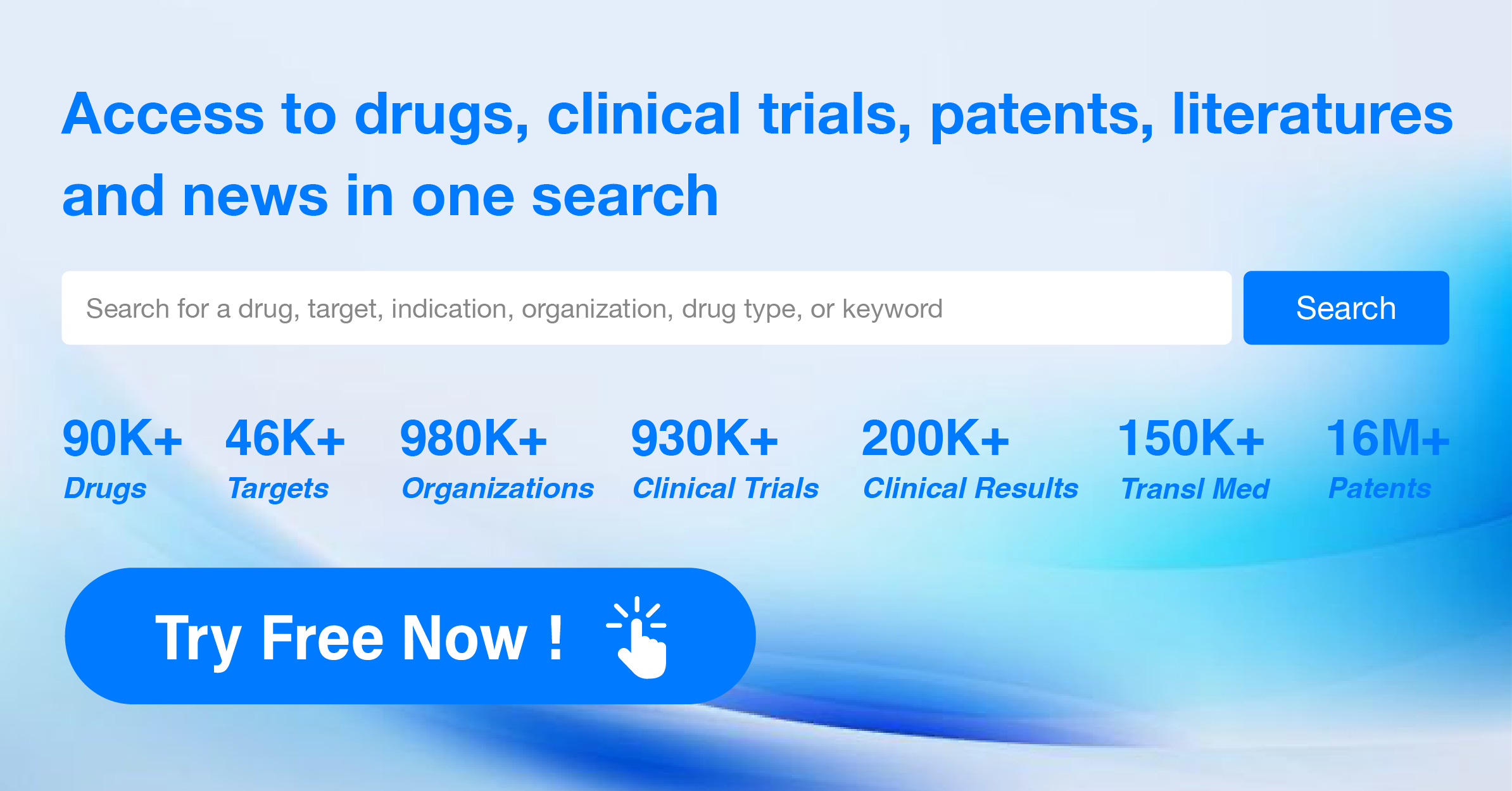Pharma Frontiers: Daily Digest of Global Pharmaceutical News - Jun 28
1.AbbVie's CD3/CD20 Bispecific Antibody Epcoritamab Approved in the US for Follicular Lymphoma Indication
On June 26, AbbVie announced that the FDA has approved Epcoritamab (brand name: Epkinly) for the treatment of patients with relapsed or refractory follicular lymphoma (R/R FL) who have received at least two prior systemic therapies. Follicular lymphoma (FL) is a type of non-Hodgkin lymphoma (NHL) and is one of the more common types of B-cell lymphomas, accounting for about 20%-30% of all NHL cases. The most common symptom is painless lymph node enlargement, typically presenting with multi-site lymphoid tissue invasion, and occasional involvement of supraclavicular lymph nodes. FL generally has a slow progression, long survival times for patients, and a high rate of transformation to diffuse large B-cell lymphoma, with a very high rate of relapse after remission. The FDA's approval was based primarily on the positive results from the Phase I/II EPCORETMNHL-1 study. This was a global, multi-center, open-label clinical trial that included 128 adult patients with CD20-positive (CD20+) R/R FL who had received at least two prior systemic therapies, one of which included an anti-CD20 monoclonal antibody, assessing the safety and preliminary efficacy of Epcoritamab. Results indicated that the overall response rate (ORR), assessed by an Independent Review Committee (IRC), was 82%, exceeding the pre-specified efficacy threshold. At a median follow-up of 14.8 months, the median duration of response (DOR) was not yet reached (95%CI: 13.7, NR), with an estimated 68.4% of patients maintaining response at 12 months. Regarding safety, no new safety signals were observed. The most common treatment-emergent adverse event (TEAE) was cytokine release syndrome (66.4%), with 1.6% of events being grade 2 or higher in severity. Epcoritamab is a bispecific IgG1 antibody developed using Genmab's proprietary DuoBody technology, targeting both CD3 on T cells and CD20 on B cells, inducing T-cell-mediated killing of CD20+ cells. In June 2020, AbbVie and Genmab entered into an agreement to co-develop and commercialize this product among three bispecific antibodies.
2.Verona Pharma's new drug for chronic obstructive pulmonary disease (COPD) has been approved by the FDA
On June 26, Verona Pharma announced that the FDA has approved the New Drug Application (NDA) for Ensifentrine (brand name: Ohtuvayre) for the maintenance treatment of chronic obstructive pulmonary disease (COPD). This drug is the first new mechanism medication approved in the field of COPD in over 20 years. Ensifentrine is an inhaled phosphodiesterase 3/4 (PDE3/4) inhibitor developed by Verona Pharma, which has dual effects of bronchodilation and anti-inflammation, and can also activate the Cystic Fibrosis Transmembrane Conductance Regulator (CFTR) to reduce mucus viscosity and improve mucociliary clearance. In June 2021, Nuance Pharma reached an agreement with Verona Pharma to acquire the development and commercialization rights for this product in the Greater China region, with a total transaction amount that could reach up to 219 million U.S. dollars (including an initial payment of 25 million U.S. dollars). The FDA's approval was mainly based on the positive results of two global Phase III clinical trials (ENHANCE-1 and ENHANCE-2) with a placebo control group. The results of the two studies showed that the average forced expiratory volume in one second (FEV1) for patients in the Ensifentrine group increased by 87mL and 94mL, respectively, and the rate of COPD exacerbation decreased by 36% and 42%, respectively. COPD refers to a chronic airway disease that can lead to airflow limitation and related respiratory problems (such as emphysema and chronic bronchitis), with symptoms including shortness of breath, frequent coughing (with and without phlegm), wheezing, chest tightness, and abnormal fatigue.
3.Novo Nordisk Announces Failure in Phase III Cardiovascular Drug Study, Resulting in $800 Million in Impairment Losses
On June 26, Novo Nordisk announced that the ongoing global Phase III CLARION-CKD clinical trial of ocedurenone, a next-generation, oral, small molecule, non-steroidal selective mineralocorticoid receptor antagonist (MRA), failed to meet its primary endpoint. The company expects to confirm an impairment loss related to intangible assets of approximately 5.7 billion Danish kroner (about $816 million) in the second quarter of 2024. This represents a negative impact of approximately 6 percentage points on the expected operating profit growth compared to previous financial forecasts. Ocedurenone, acquired from KBP Biosciences for $1.3 billion, is a non-steroidal mineralocorticoid receptor (nsMR) antagonist known for its long half-life and high MR affinity.
The CLARION-CKD study is a multicenter, randomized, double-blind, placebo-controlled clinical trial (n=600) evaluating the effectiveness and safety of ocedurenone in patients with uncontrolled hypertension (systolic blood pressure between 140 and <180 mmHg) and moderate to severe chronic kidney disease (stages IIIb/IV). The primary endpoint of the study was the change in systolic blood pressure from baseline at week 12. The Independent Data Monitoring Committee concluded from the interim analysis that the trial met the predefined criteria for futility, meaning it did not achieve its primary endpoint. As a result, Novo Nordisk decided to discontinue the CLARION-CKD study. The company forecasts that this decision will reduce the projected operating profit growth for Q1 of 2024 by 6%.Furthermore, Novo Nordisk is assessing further development plans for ocedurenone in other indications.
4.HUTCHMED Introduces Antitumor Drug Tazemetostat for Priority Review Consideration
Recently, the China National Medical Products Administration's Center for Drug Evaluation (CDE) disclosed on its official website that HUTCHMED's application for Tazemetostat Hydrobromide tablets is proposed for priority review. The planned indication is for adult patients with EZH2 mutant-positive and previously treated with at least two systemic therapies for recurrent or refractory follicular lymphoma (FL). According to publicly available information from HUTCHMED, Tazemetostat was developed by Epizyme, a company under Ipsen, as an EZH2 methyltransferase inhibitor. HUTCHMED is responsible for the research, development, production, and commercialization of Tazemetostat in the territories of mainland China, Hong Kong, Macau, and Taiwan. Follicular lymphoma (FL) is a subtype of non-Hodgkin lymphoma, accounting for about 17% of non-Hodgkin lymphoma cases. Tazemetostat, a "first-in-class" EZH2 methyltransferase inhibitor, works by inhibiting EZH2 which thereby inhibits the methylation of H3K27, restoring the expression of tumor suppressor genes, and promoting differentiation of B cells or inducing apoptosis, hence controlling tumor growth. The drug received accelerated approval from the U.S. FDA in January and June 2020 for treating patients with advanced epithelioid sarcoma and certain cases of recurrent/refractory follicular lymphoma, respectively. In March 2023, Tazemetostat was approved for marketing in Macau, China. In September 2023, HUTCHMED announced the completion of patient enrollment in a bridging study in China for Tazemetostat, which aims to support its conditional approval in China based on its U.S. approval.
5.Coherent Biopharma’s Bi-XDC Product Receives Third Orphan Drug Designation from FDA for Small Cell Lung Cancer Treatment
On June 26, Coherent Biopharma announced that the U.S. FDA has granted orphan drug designation to its independently developed second-generation bi-ligand conjugated drug (Bi-XDC), CBP-1019, for treating small cell lung cancer (SCLC). To date, CBP-1019 has received three such designations from the FDA for the treatment of pancreatic cancer, esophageal cancer, and small cell lung cancer. Lung cancer, one of the most common cancers, includes SCLC, which is the most malignant form, accounting for 15%-20% of all lung cancers. The cancer cells grow rapidly, are highly invasive, and tend to metastasize early to distant organs such as the brain, liver, bones, and adrenal glands. About two-thirds of SCLC cases are at an extensive stage at the time of diagnosis. Currently, SCLC remains an aggressive and deadly cancer, and patients urgently require novel treatment options. CBP-1019, developed by Coherent Biopharma, is a second-generation product of Bi-XDC technology. The drug is designed with dual ligands, FRα/TRPV6, carrying a new generation of camptothecin derivatives, making it an innovative and optimized successor to the Bi-XDC drug CBP-1008. According to pre-clinical study data, CBP-1019 has shown efficacy in suppressing tumors in various cancers including gynecological tumors, lung cancer, pancreatic cancer, and colorectal cancer. Currently, CBP-1019 has initiated an international multi-center clinical study in Phase 1/2. As of April 2024, CBP-1019 has progressed to the 4.0 mg/kg dosage group and has shown good safety and preliminary therapeutic effects.
6.Intellia's In Vivo CRISPR Gene Therapy Completes Clinical Proof of Concept
Recently, Intellia Therapeutics released the latest clinical data for their CRISPR/Cas9 gene-editing therapy, NTLA-2001. Three patients with transthyretin (ATTR) amyloidosis who initially received the lowest dose of NTLA-2001 in a Phase 1 dose-escalation study achieved a median 90% reduction in serum transthyretin (TTR) protein levels after subsequent treatment with 55 mg of NTLA-2001. According to the press release, this is the first clinical data to demonstrate that an in vivo CRISPR/Cas9 gene-editing therapy can be effectively redosed, successfully completing clinical proof of concept. In the Phase 1 trial, the three initial patients received a dose of 0.1 mg/kg of NTLA-2001, and by day 28, their median serum TTR was reduced by 52%. As expected, the serum TTR reduction at a dose of 0.1 mg/kg was below the target level. All three patients, after completing the two-year observation period specified in the study protocol, were treated with a 55 mg dose of NTLa-2001. The patients reached the target pharmacological effect 28 days after receiving the subsequent treatments, with a median reduction in serum TTR of 90% and a 95% reduction compared to original baseline levels. After the subsequent doses, all patients tolerated NTLA-2001 well. One of the three patients experienced a mild infusion-related reaction upon receiving the 55 mg dose. The safety and pharmacology of redosing NTLA-2001 were consistent with the results from a single 55 mg dose. Furthermore, the earliest treated patient has been followed for more than three years, continuing to exhibit good safety and tolerance. NTLA-2001 is part of a multi-target discovery, development, and commercialization collaboration between Intellia and Regeneron, with Intellia leading the development and commercialization of NTLA-2001.
7.Novo Nordisk's oral dual agonist amycretin approved for clinical trials in China, achieves over 13% weight reduction in 12 weeks!
On June 26, the Center for Drug Evaluation (CDE) of China's National Medical Products Administration announced the approval for clinical trials of Novo Nordisk's Class 1 new drug, amycretin tablets, intended to reduce the weight of adults who are overweight or obese. Public information indicates that this is a long-acting dual agonist for oral GLP-1 receptors and insulin receptors, representing a new generation of weight loss therapy. In a small phase 1 clinical study previously disclosed by Novo Nordisk, patients treated with this product experienced a 13.1% reduction in weight after 12 weeks (compared to 1.1% in the placebo group), demonstrating rapid weight loss effects and good clinical application potential.
Amylin, beyond the GLP-1 signaling pathway, is another hormone associated with hunger and satiation. Research shows that amylin can reduce energy intake, regulate food choices and preferences, and acts in conjunction with insulin to regulate glucose, inhibit postprandial glucagon release, and delay gastric emptying. Furthermore, there is potential for synergistic effects between amylin receptors and GLP-1 receptor agonists.
According to information from the Novo Nordisk official website, amycretin is a long-acting synergistic agonist of GLP-1R and amylin receptors. It is being developed in two formulations: a subcutaneous injection (once weekly) and an oral form (once daily), currently intended for obesity indications. In March of this year, Novo Nordisk announced the latest clinical trial results for oral amycretin. This was a small phase 1 trial involving 16 patients, where the treatment led to a 13.1% weight reduction after 12 weeks, in contrast to only 1.1% in the placebo group. Additionally, amycretin exhibited good pharmacokinetic properties, and similar good safety, tolerability, and adverse reaction profiles as other GLP-1 class therapies developed by the company.
8.Novo Nordisk Acquires Gene Editing Therapeutics and Platform
On June 26th, 2seventy bio announced that it has entered into an Asset Purchase Agreement (APA) with Novo Nordisk. Under the terms of the APA, Novo Nordisk will acquire the rights to the hemophilia A program and 2seventy bio's in vivo gene editing technology platform, which is primarily used for the development of autologous or allogeneic cell therapies for autoimmune diseases. Following the signing of the agreement, the 2seventy bio team involved in the development of this technology platform will join Novo Nordisk and continue to advance its development. According to the terms of the agreement, 2seventy bio may receive payments totaling up to $40 million. Upon completion of the asset divestiture, 2seventy bio will focus on the commercialization and ongoing development of Abecma (idecabtagene vicleucel). Originally, 2seventy bio collaborated with Novo Nordisk in 2019 to develop gene editing therapies for hemophilia A. Abecma, a BCMA-targeted CAR-T cell therapy, was approved for marketing in the United States in March 2021 for the treatment of patients with relapsed or refractory multiple myeloma (R/R MM) who have previously received at least four lines of therapy, including immunomodulators, proteasome inhibitors, and anti-CD38 monoclonal antibodies. In April of this year, its indication was expanded to include third-line treatment.
How to obtain the latest research advancements in the field of biopharmaceuticals?
In the Synapse database, you can keep abreast of the latest research and development advances in drugs, targets, indications, organizations, etc., anywhere and anytime, on a daily or weekly basis. Click on the image below to embark on a brand new journey of drug discovery!




